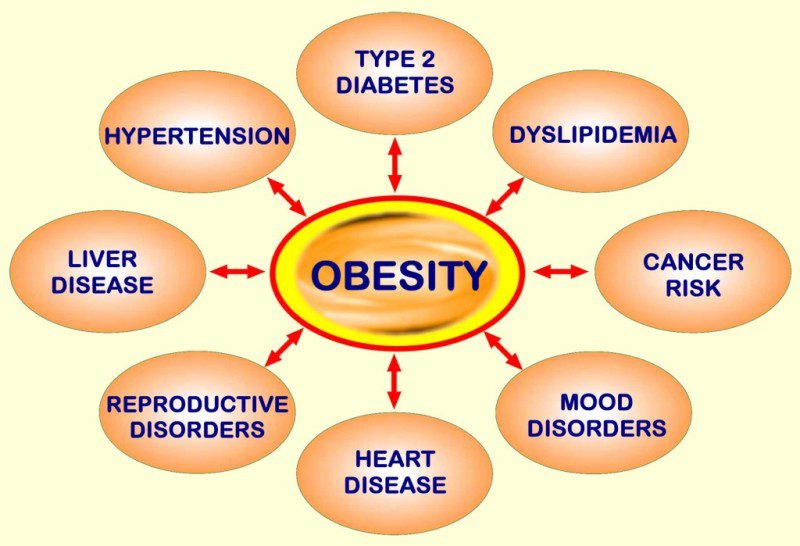Obesity is a medical condition in which excess body fat accumulates to such an extent that it can have a negative effect on health.
People are generally considered obese when their body mass index is 25.0BMI or higher. Body mass index (BMI) is a measure of body fat based on height and weight. Applies to both men and women.
Over the last two decades, obesity has become more prevalent in Pakistan due to lack of physical exertion and high consumption of poultry foods.
High BMI is a threat, a disease commonly found in rich countries But now it has set foot in poor countries.
Obesity is generally divided into three categories by weight.
The first stage is low obesity or mild stage, it has 10 to 15 percent more weight than normal. The second stage is middle stage in which 15 to 20 percent weight gain.
Another important thing that has come to light is the amount of fat on different parts of the body, i.e. where the fat has accumulated more.
Fat that accumulates on the thighs and buttocks is less harmful, while fat that accumulates on the abdomen is dangerous. It is associated with diabetes, high blood pressure and heart disease.
Excess body weight is linked to a variety of diseases and conditions, especially heart disease, type 2 diabetes, lack of sleep, certain types of cancer, osteoarthritis and asthma. As a result, obesity reduces life expectancy.

A link between obesity and depression has been found, in which obesity increases the risk of depression and depression also increases the risk of obesity.
A study has shown that obese people have a higher risk of cod. Obesity is a major cause of death worldwide with increasing rates in adults and children.
Obesity is more common in women than men. Experts see it as one of the most serious public health problems of the 21st century. There are individual, social, economic and environmental causes of obesity including diet, physical activity, automation, urbanization, genetic susceptibility, medications, mental disorders, economic policies, endocrine disorders and endocrine disruptive chemicals.
If you consume more than 50 calories per day, you can gain 52 kg more than normal weight in ten years. Obesity can occur in people of all ages, but middle-aged people are more prone to obesity. One of the main causes of obesity is overeating and especially consumption of high fat and sweet foods. Family causes also play an important role in obesity. People who are lazy and avoid work and prefer to sit and work become obese.
The mother’s weight continues to increase during pregnancy due to the increase in the amount of fat. Preventing obesity requires a complex system of action, including intervention at the community, family and individual levels, following important advice from experts in diet and exercise.
This can be improved by reducing the intake of whole foods, such as reducing the amount of fat or sugar and increasing the amount of dietary fiber. To reduce appetite or reduce the absorption of fat, medicines can be used with proper diet.
If diet, exercise and medicine are not effective, gastric surgery may be performed to reduce the volume of the stomach or the length of the intestines. As a result, the skin feels full or the ability to absorb nutrients from food is reduced. Weight loss is very important to reduce the ill effects of obesity.
For this purpose it is necessary to reduce the fat and carbohydrates in the diet and also to avoid smoking and alcohol.
Remember that diet can help control obesity as well as diabetes and blood pressure. So if you want to stay healthy, start eating vegetables and fruits instead of sweets and poultry. Those who are overweight should keep in mind that dietary restrictions must be maintained in order to eliminate accumulated fat.
It is a common observation that the initial few kilograms of weight is easily and rapidly lost due to the rapid weight loss due to the breakdown of glucose and water leakage in the beginning and then the speed slows down.
This is because after three to four weeks, only fat tissue breakdown leads to weight loss, which is a slow process. Although exercise is important for weight loss, it is not only possible to lose significant weight through exercise but it is also important to change the diet appropriately.
The patient should know which foods to consume in what amount also, how many calories are found in which food. For example, if a person needs a 1000 calories, then he will need one hundred grams of starch, 50 grams of protein and 40 grams of fat daily.
It is also important to include a variety of salts and vitamins in the diet. If we talk about a person who weighs 60 kg, then he needs about 30 calories per kilogram for normal living and daily activities, i.e. 1800 calories per day. In other words, It may take 1800 calories to maintain a weight of 60 kg but to lose weight you need to reduce the amount of calories.
Because the main cause of weight gain is excessive calorie intake and lack of physical activity. If a person gains weight who should weigh 60 kg, then he should consume about 1300 calories daily to lose weight.
In this way, he can lose one kilogram in a week, but it is very important to keep in mind that the diet should include adequate amount of vitamins, proteins and minerals, i.e. it is very important to eat a balanced diet.
When the weight reaches 60 kg then 1800 calorie diet should be restored but be careful not to consume more calories as it will cause weight gain again. It should be kept in mind that fresh fruits should be included in the diet. Adequate amounts of fresh vegetables, meat, milk, eggs and fat should be included.
Make it a habit of your life and that is regular exercise. Try never to get tired in exercise as it is an essential part of life for weight control and maintaining it.
Nowadays, there is a lot of emphasis on dieting i.e. eating very little food. But remember that There are benefits but sometimes it also causes irreparable damage to the body.
Similarly, appetite suppressants are also used to lose weight. Sometimes thyroid hormone is used to speed up the metabolism, but there is a risk of harm from using these drugs.
Surgery can also be used to reduce fat from certain parts of the body. Surgery is also an effective way to reduce the size of the stomach, bypass the stomach, and perform surgery on the small intestine.
Yoga can also be helpful in reducing weight because there are some yoga postures that are very effective in losing weight.


